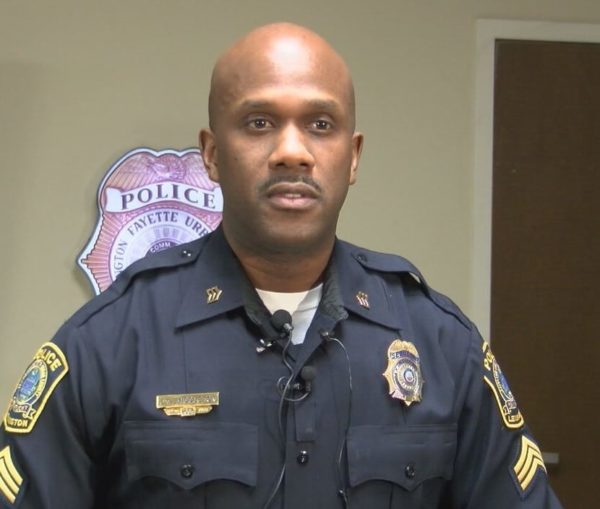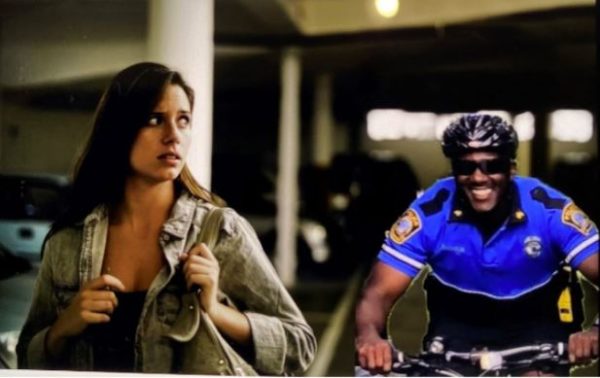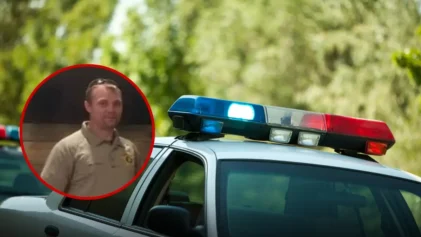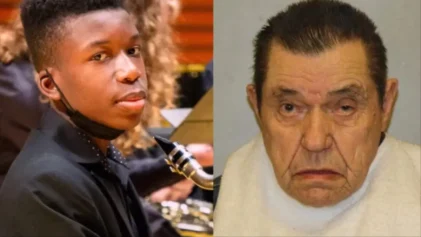A Black policeman in Lexington, Kentucky, was fired earlier this year for providing sensitive information about several of his fellow officers to Black Lives Matter protesters who marched through the city last summer clamoring for police reform.
But in a lawsuit filed last month, the former cop denies the allegations that he fed protesters sensitive information that wasn’t already public knowledge and demands he be reinstated to the police force.
“I’ve always said that this is bigger than me,” Jervis Middleton told Atlanta Black Star. “I have my issue that I need to be made whole from. But there’s systemic changes that just have to be made, and it’s been there.”

Middleton, 49, was hired as a Lexington police officer in 2007 and held many positions in the agency before becoming a sergeant. He held that rank until 2019 when he was bumped back to a patrol officer. He said forces inside the department kept him from climbing the ladder and some ranking officers made it a point to keep him from advancing.
“When I started in the police agency, my goal was to help make some changes by moving up,” Middleton said. “It’s always harder for black males and females to move up in policing. So you’ve got to be 10 times the best at everything and be sharp. So I did that, started moving up the chain, and animosity came. People started anointing me as the next chief and getting attitudes. So when they had a chance to pounce on me, they did it. And I never really got a chance to even explain to them anything until they had already made up their minds.”
Middleton’s 77-page complaint filed April 23 in Fayette Circuit Court names the Lexington Police Department as well as the Lexington Fayette County Urban Government, which presides over the police department.
The County Council voted to terminate Middleton during a Feb. 18 disciplinary hearing, ruling that he violated two of the three operational policies a police department internal investigation concluded he had transgressed. Lexington Police Chief Lawrence Weathers, who is Black, said during the hearing that Middleton’s revelations inflamed tensions between the police department and the community.
Middleton’s lawsuit claims a system of racism permeated the department, as evidenced by the disproportionate makeup of the ranks. Only 49 of the department’s 603 officers were Black in July 2020, according to the civil claim.
“We’ve got a culture within the Lexington Police Department that’s got a history of really turning the other cheek to racist behavior,” Middleton’s Louisville attorney Sam Aguiar said during a phone interview Friday. “And I hope a lawsuit like this can uncover more of it through discovery, and can really prompt them to rethink the way they do things. To think twice before they start engaging this type of behavior again.”
Aguiar represented the family of Breonna Taylor in a lawsuit against the city of Louisville, which resulted in a record-setting $12 million settlement for the slain woman’s loved ones.
He described Middleton’s ordeal as suddenly being hit with a bag of bricks.
“It hits you point blank,” Aguiar said. “You’re a police officer, you realize how Black America is treated by white officers. And then all of a sudden it’s like, ‘Whoa, I was part of this brotherhood, and they’re doing this to me.'”
Middleton alleged citizens made 30 informal complaints of racial bias in 2018 and 2019. All but two were dismissed as unfounded and none resulted in disciplinary action.
More than 1,000 formal and informal complaints were lodged against officers between 2011 and 2020. Less than 8 percent resulted in any type of disciplinary suspension and just one officer was terminated following a formal investigation in the 10 year-period leading up to Middleton’s February hearing.
“I didn’t grow up wanting to be a cop, it was a calling,” Middleton said. “I didn’t find that out until later in life, but it was. So to be treated the way they treated me also makes me think about how Black males get treated when police have their mind set on accusing someone or charging them. Regardless of what the evidence comes out, they still do it. So if they’re doing it to me, some of these complaints that we hear on the street, they’re definitely doing them.”
Middleton lodged an appeal to overturn the county government’s decision to terminate him in a separate circuit court filing March 19, according to WKYT. That lawsuit calls for him to be reinstated with back pay and benefits.
Middleton is also asking a judge to fully reinstate him in his latest lawsuit, but he’s also petitioning for damages for humiliation, embarrassment, emotional distress and mental anguish. Aguiar explained that the request that Middleton be reinstated is a legal requirement for him to recoup back pay for lost wages.
Middleton claims he was subjected to a hostile work environment based on his race. He detailed years of alleged discrimination he faced and said department officials never took action to address the hostile climate, even after he filed a grievance.
That included memes that circulated amongst officers, which depicted Middleton as a menacing officer to white women. One ranking officer told Middleton to turn his “Black-ass face around” during a crisis negotiations meeting, the lawsuit alleged. Middleton claimed several members of the department derisively referred to him as the “token boy.” One lieutenant who worked alongside Middleton for years suggested that Middleton would one day be his boss because he’s Black and the “Chief’s boy.”
“The insinuation was clear that Jervis would be on a fast-track to advancement within LPD because of his race and the need for LPD to show some semblance of diversity, rather than because of Jervis’s abilities as a member of LPD,” the lawsuit stated.

Middleton formally complained about the harassment to the police department’s Public Integrity Unit.
In 2018, a woman alleged that Middleton climbed on her roof and had officers surveil her home after she and Middleton’s sexual relationship ended, according to the lawsuit and the Lexington Herald-Leader. A jury acquitted Middleton of official misconduct in February 2019 after finding the woman’s story not credible. But the police department continued to investigate Middleton for policy violations stemming from her accusations.
Seeking to spare his family from enduring another probe into his alleged affair, Middleton decided to settle with the department to end that investigation. He was demoted to patrol officer as part of the settlement, and he agreed to drop his racial discrimination grievances. That brought to an end any investigations into the racist memes and slurs against Middleton.
Middleton claims race factored in the department’s decision to terminate him. He also argued it was retaliation for speaking out and formally complaining about the systemic racism he said was prevalent in the police department. The lawsuit claims his termination was infringement upon Middleton’s First Amendment rights and unlawful discrimination.
The complaint chronicled a history of Lexington’s white police officers committing misconduct with little to no accountability. One officer had at least 17 citizen complaints filed against him between January 2018 and May 2019. Time after time, the officer received no discipline until he initiated a car chase that led to a bad crash in which several innocent people were severely injured. The officer was suspended for 60 days but remained on the force.
Another officer also kept his job after threatening a woman with a gun and using racial slurs. When video footage showed a department chaplain punching a teen in the head while he was detained on the ground, the chaplain was allowed to retire and collect his pension.
Middleton, who once served as spokesman for the Lexington Police Department, was an outspoken sympathizer with the protesters’ cause. His lawsuit indicates that for years he struggled against the systemic ills last summer’s demonstrators rallied against, experiencing them from behind the blue line. Middleton said he was frustrated, angered and disheartened by the deaths of Breonna Taylor, George Floyd and other unarmed Black men and women killed at the hands of law enforcement.
“It was awful,” he said of Floyd’s death, which sparked a global reckoning on race. “It was heartbreaking. It was heartbreaking that it happened, it was heartbreaking to see some of the people that I work with defend it. It just opened up in me some of the ways I had already been mistreated at the agency too.”
Middleton joined the chorus of officers across the nation who publicly condemned racially biased police practices and called for sweeping reforms in law enforcement last summer. He attended several nights of protests in uniform and tried to relate to the angry members of the community frustrated by police violence. Middleton danced with protesters at one rally, and tried to keep the lines of communication open with frustrated members of the community.
In private conversations with his cousin Sarah Williams, Middleton shared his frustrations about the double standard he saw in the Lexington department. Williams was a protest organizer who became a vocal figure in Lexington’s push for more accountability in law enforcement. Middleton had a series of text messages and phone conversations with Williams between May 31 and June 12. He lamented about at least 10 officers and shared details about their racial misconduct and the department’s lax discipline.
Middleton identified officers who “deserved to be yelled at” during the protests because of their police misconduct. He told Williams one officer investigated a fatal June 2020 DUI crash in which a Black motorcyclist was killed. He allowed the white suspect, Matthew Starling, to smoke a cigarette at the crime scene and didn’t give Starling field sobriety or breathalyzer tests for several hours.
But Middleton later told Williams he was only venting and said she shouldn’t target the officers, according to the lawsuit.
Middleton also told Williams about a tactical riot unit the police department deployed to handle the large crowds at the rallies. He even monitored his radio when he was off duty so he could notify Williams when the unit was called out.
During their exchanges, Middleton referenced multiple acts of sexual misconduct. One officer was investigated in April 2020 for sending pictures of his penis to people in chat groups on several occasions while he was uniformed and on duty in his squad car. Another also sent out photos of his penis to several people, including a civilian employee of the police department. Neither of the white officers were terminated, rather, the department indicated they were suspended for “inappropriate conduct.”
“Jervis sent private messages, and he’s allowed to vent his frustrations,” Aguiar said. “He was surely a guy justified in venting those frustrations.”
Lexington police investigators alleged Middleton gave Williams “sensitive” info as well as “strategic” and “operational plans.” The department’s stance was that he fueled Williams with personal information about undercover officers that she and other protesters could use to heckle police during the protests.
Officers began circulating word throughout the department in early June that Middleton was relaying “sensitive” information to demonstrators. He became a pariah on the force, “with rumors circulating about him that grossly overstated the substance of any communications he was having,” his lawsuit stated. Fellow officers treated him like a traitor and informant.
Some even leaked the rumors to local reporters that he was feeding classified information to protestors about undercover officers, the lawsuit alleges. One police sergeant admitted to internal investigators that he shared that claim with his ex-wife, who is a TV reporter for a local Fox News affiliate. He was not disciplined.
Police arrested Williams on June 14 and accused her of “inciting a riot.” Investigators obtained a search warrant to seize her cellphone. They searched Williams’ Facebook history and extracted hundreds of texts messages from her phone.
Aguiar argued the real intention behind the search warrant was to recover damning evidence against Middleton, who he said they likened to a treasonous war criminal.
“LPD members essentially acted under the preconceived notion that Jervis was guilty of treason, acting in a manner which would be similar to the sharing of nuclear codes, leaking of information to Russia or crossing lines and feeding war tactics to Nazi Germany,” the attorney wrote in the lawsuit. “LPD basically adopted the mentality that demonstrations for racial equality and police accountability in Lexington were the equivalent of the Battle of Gettysburg.”
Department officials opened an internal inquiry into the claims against Middleton, questioning him and several other officers.
Ryan Holland, an officer who was called out by a white protester for sending inappropriate pics, accused Williams of making the disparaging comments. A Facebook Live video showed it wasn’t Williams, however. Holland insisted it was and blamed Middleton for being “their little snitch.”
“I believe that he’s snitching to them and giving them information,” Holland told the internal investigators.
On Aug. 5, the investigators filed a formal complaint alleging three policy violations, which were later substantiated against Middleton.
“Officer Middleton made disparaging and hostile remarks about officers and command staff personnel in addition to providing sensitive and personal information about Lexington Police employees to Ms. Williams, which enabled her to use the information in a manner that affected the efficiency of the employees as well as the department,” department officials wrote in an official report. “Some of the information provided was personal in nature and could cause embarrassment, if exposed, to other employees or members of the public.”
Middleton said instead of seeing his rapport with protesters as a threat, the city and police department missed an opportunity to use him as a bridge between the badge and community. Aguiar said that would have been a perfect spot for Middleton, but the result instead will be a chilling effect for other officers.
“The implicit effect of all of what was done to Jervis is that a message was sent throughout the department that if you ever, ever try to cross that blue wall and call out anybody within this department, your ass is gone,” Aguiar said. “And it doesn’t matter. We’ll do whatever it takes to make sure that you are gone. We don’t care if you go out and you ram people with your cars, you may get a slap on the wrist. We don’t care if you go out and discriminate against the community. We don’t care if whip your d–k out, we don’t care if you get drunk and drive. You can keep your job after that.
“But if you ever try to suggest one of our officers is racist,” the attorney added, “or if you ever even talk to somebody that stands up against police, your ass is gone. So the problem is it’s created an incentive for more silence within the department.”


